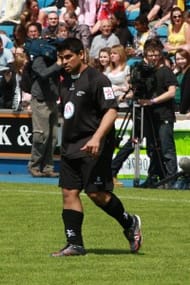Judan Ali has experienced both remarkable success and bitter frustration in his career as a professional footballer. He was born in the UK after his family migrated to UK from the Indian Sub – Continent , and he faced several obstacles, some familial and others cultural, in his attempt to become an English club footballer. He had a spell at Arsenal, and he went on trial at over 50 other clubs all over Britain, but his true calling turned out to be football coaching rather than playing. He has tasted some incredible victories while working with budding footballers from Asia, thus debunking the myth that players of Asian origin lack the natural ability to compete with players from other continents. He now has his sights set on developing a strong footballing culture in India, and he has already attained substantial success in his attempts so far. In an exclusive interview, Judan, along with former Manchester United FC legend and current sports pundit Lee Sharpe, spoke with Sportskeeda correspondent Siddharth Sharma.
Q. Having experienced racial discrimination in the 80′s in England, do you think the scenario has now changed for people with darker skin tones?
Judan: Over the last 20 years, England has seen more diversity than it has in the 100 years preceding them. Society as a whole has become much more open to these debates as opposed to the 80s, when racism was pushed aside and no one dared challenge it. In my opinion, racism now is much more hidden because there are consequences if the perpetrator is caught. However, it’s no surprise that we are witnessing the odd incident at the top level; after all, I frequently hear of numerous incidents that occur at the grass roots level and in park football.
In fact, I think it’s harder now to make it as an English–born footballer regardless of your skin tone due to the influx of foreign players from abroad. There is also the stigma that if you came froman Indian, Pakistani, Bangladeshi or Sri Lankan background you are too small and physically weak to play football; also, most Asians came over to England to provide better living and education to their children and so frown upon football as a career option for them. Therefore, it is very challenging for a modern Asian footballer to break into the professional game.
In Euro 2012 there are already warnings being issued by the authorities to fans travelling to the championships to be careful of racism. So it is clear that this is a global issue and not just an English one. We as human beings and parents have a duty to teach our children right and wrong, and if we do not take a hard look at ourselves then we are never going to get rid of racism in society. It’s a shame that football, probably the most influential medium on the planet, has not mastered this message yet.
Q. The Luiz Suarez-Patrice Evra case of alleged racial abuse came to light recently. The FA’s report stated that both the FA and Patrice Evra did not think that Suarez was a racist, but the Uruguayan was still banned. On the other hand, there was an incident involving John Terry and Anton Ferdinand that wasn’t investigated by the FA. Earlier this month, Anton was subjected to racist chants at Stamford Bridge like “Anton, you know what you are”. Do you think that the FA has a biased approach in tackling this age-old problem of racism?
Judan: I fully support the FA’s stance on tackling issues of racism in England. As a professional football coach, I am part of a team of highly qualified coaches that have been put through rigid processes of deploying coaching of the highest standards to the footballing coaching community, at all levels of football. The FA have learnt from the past and we will, hopefully, see fewer such incidents at all levels of the playing field in the future.
Q. Alongside ex-United midfielder Lee Sharpe, you have embarked on a scouting mission across India to find talented youngsters to play at big clubs in Europe. What do you look for in these young players?
Judan: People’s perception of sport in India is that cricket is the only sport that every child grows up playing. However, on my travels to India, I found out that any person that takes up football has genuine talent; a young adult that plays cricket may end up playing it just for fun whereas a young adult that plays football is most likely to take it more seriously.
We are looking for something exceptional in a footballer. There is no point in us recruiting someone that can only compete against average professional footballers. We want the Messis, the Ronaldos, the Lampards and the Buffons. I know there are exceptional talented footballers in India, and why wouldn’t there be in a population almost 1.2 billion? I have already witnessed many talented players who are under 16 showcasing their amazing skills.
Lee Sharpe: I am looking forward to witnessing for myself the talent that there is in India; what I’ve heard from Judan so far really excites me. I believe that there is talent in areas of the world which haven’t got access to funding, and that is why I set up up the Lee Sharpe Foundation to help provide funds to these areas. Based on what Judan has already achieved and identified in India, hopefully this venture will be a long-term success.
Q. The group of 15-year-old boys from India under your wing went on to win the Arsenal International Tournament. What do you think were the strengths of these young Indian footballers?
Judan: The boys won a tournament in which there were participants from countries that have professional football academies and which spend hundreds of thousands of pounds on youth infrastructure. The Indian boys are proof that you don’t need money to be at the top of the world, even in the modern day game.
The strengths of the Indian boys were that they all had heart, passion, self-belief, determination and the willingness to listen to instructions. They shared the mutual feeling that they were all equals, without letting their egos come in the way of their team spirit, and that is rare to find in modern English football, especially at the top level.
Q. When you came to India to scout for boys for the Arsenal International Tournament, which region did you think had the maximum potential to churn out players who would excel at football?
Judan: Trials were held all over India, and players came from as far afield as Nepal, Goa, Delhi and players came from as far as Mumbai, the heart of Bollywood. The way I look at it, all of India has talent – it’s just a numbers’ game at the end of the day, and the best of the best will surface in any region, although I am aware that Goa boasts that it has the highest success rate in the I-League so far.
Q. Having played in both England and Spain, where do you think Indian kids would be more suited to play?
Judan: I have been very lucky to have studied at La Masia and FC Barcelona, and I am confident that the Indian youth will be suited towards the Spanish way of playing where the emphasis is more on technique and skill. However, having said that, in England, the FA are moving towards this style of play and we will see more talented youngsters in the future playing this style in English football.
 Q. India’s star striker Sunil Chhetri earned a contract at QPR but was not given a work permit to play. Rising sensation Jeje also earned trials at Glasgow Rangers FC, but these were possibly just marketing gimmicks. Do you think FIFA’s rule of allowing only players of countries whose ranking is above 70, in order to avoid turning players into shirt selling mules, is justified?
Q. India’s star striker Sunil Chhetri earned a contract at QPR but was not given a work permit to play. Rising sensation Jeje also earned trials at Glasgow Rangers FC, but these were possibly just marketing gimmicks. Do you think FIFA’s rule of allowing only players of countries whose ranking is above 70, in order to avoid turning players into shirt selling mules, is justified?
Judan: Sharpe and I both believe that a player should be able to play anywhere in the world based on his merit, and not based on where he comes from. This is why I am keen to work in a country which is ranked lower than 70 and take it to the World Cup finals, so that I can prove to FIFA that they are wrong to uphold this rule. I have already proved that it can be done at youth level, and I am determined to do the same at the international senior level, should the opportunity arise.
There are some football clubs that did exploit footballers of Indian background to sell shirts but that wasn’t endorsed by the FA. I felt disgusted about that, but I do not wish to name those clubs because it wasn’t the clubs’ fault; it was the fault of the corrupt people that were governing those clubs.
So now you know how Judan Ali plans to improve the state of football in India. To keep updated with the search for footballers please like the following link
http://www.facebook.com/footballindiabestofthebest2012
You can also stay in touch via twitter:
https://twitter.com/#!/judanali
https://twitter.com/#!/lsharpeofficial


